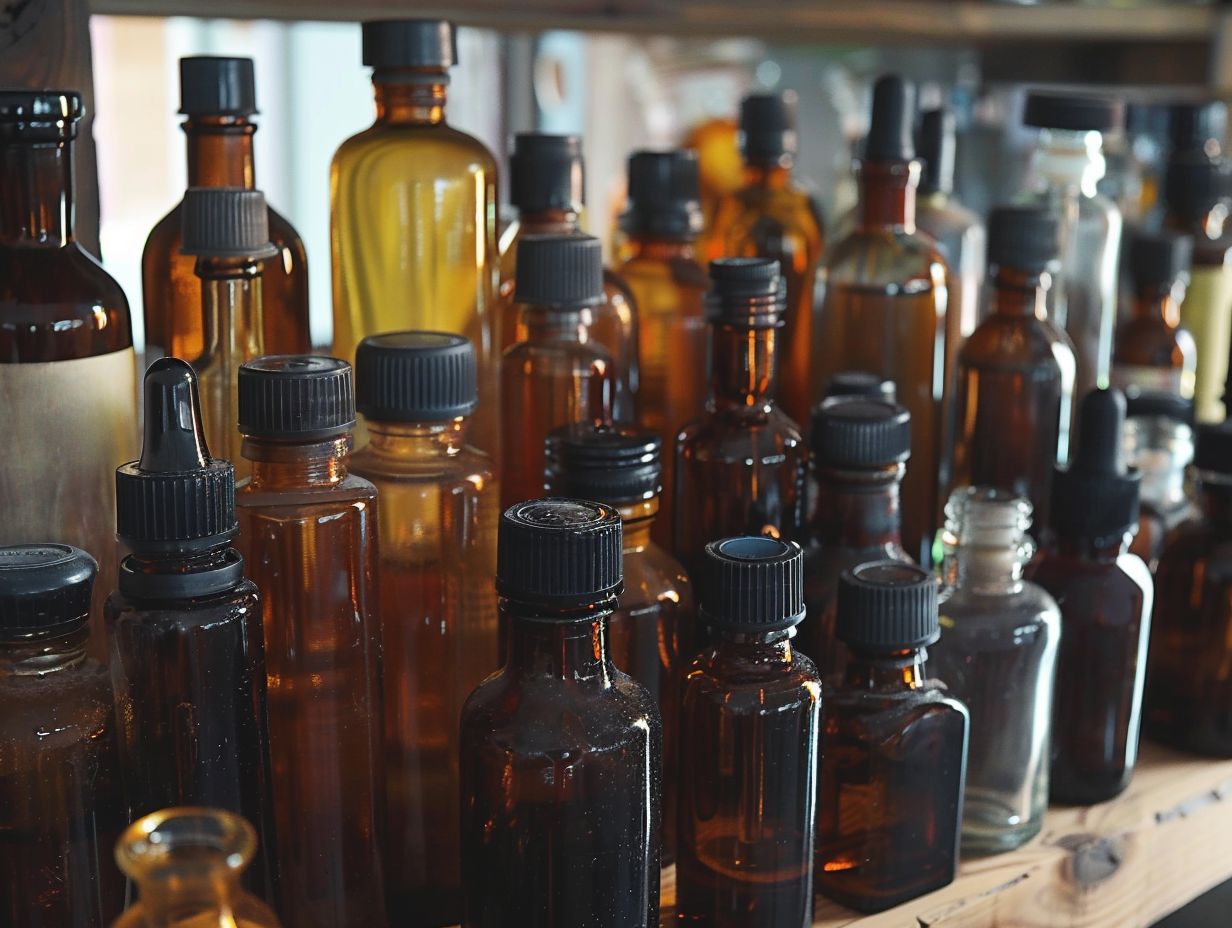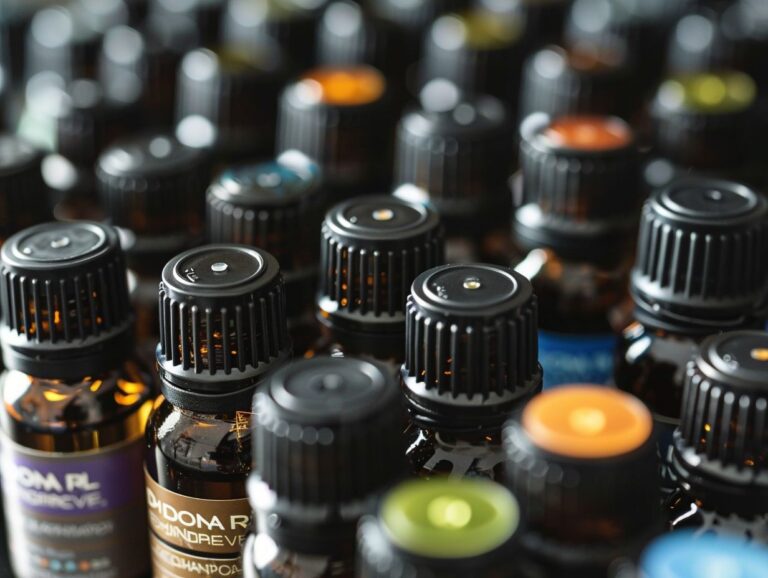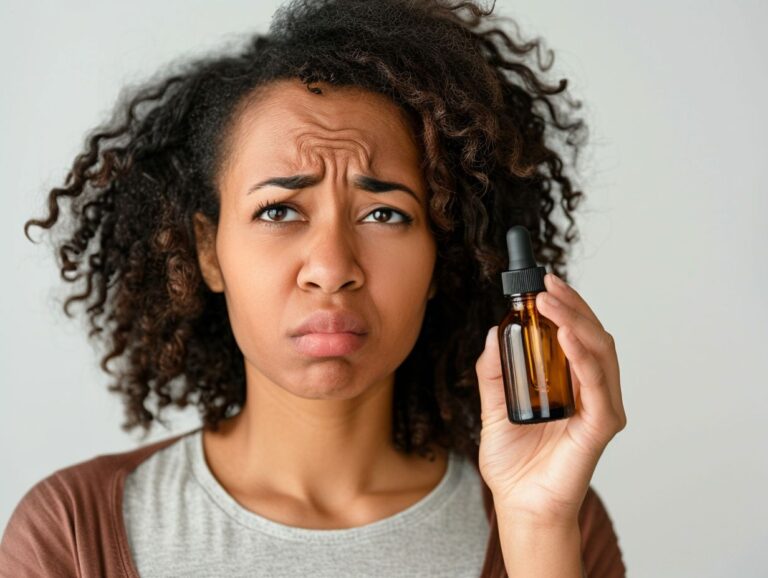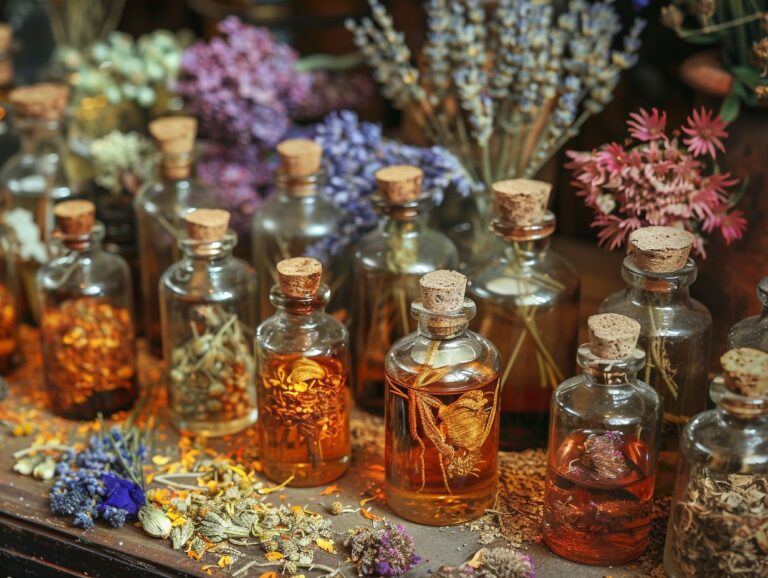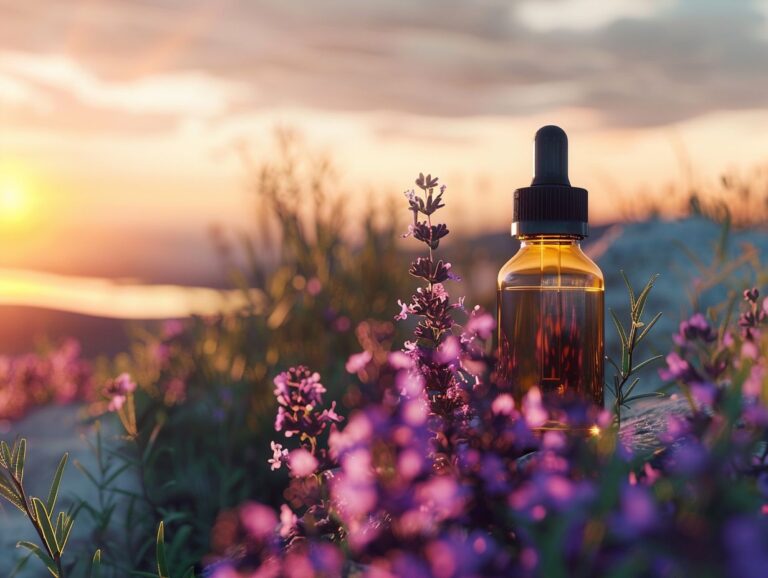What Essential Oils Are Musky
Essential oils have gained popularity for their various benefits, but have you ever wondered what makes an essential oil musky?
We explore the different types of musky essential oils, their benefits, and potential risks. We also discuss how to use musky essential oils through topical application, inhalation, and diffusion.
Get tips on blending musky essential oils with other scents and explore alternatives to musky essential oils. Dive in and discover the world of musky essential oils!
Key Takeaways:
What Are Essential Oils?
Essential oils are natural aromatic compounds extracted from plants. They are highly concentrated and have unique scents that can be used for various purposes.
These oils are extracted through different methods such as steam distillation, cold pressing, or solvent extraction, ensuring the purity and potency of the final product. Each essential oil carries specific properties that make them ideal for crafting DIY projects like candles, homemade soaps, and beauty products. Creating your own blends with individual scents allows you to customize fragrances to suit your preferences and benefit from their therapeutic effects.
What Are The Different Types Of Essential Oils?
There are various types of essential oils available, ranging from single scents like Amyris and Sweet Orange to complex blends that offer a combination of scents.
Single scents are often cherished for their pure, unadulterated aromas that can transport you to different realms with just a drop. For instance, Amyris emits a woody, warm fragrance that promotes a sense of calm and tranquility. On the other hand, Sweet Orange is beloved for its uplifting citrusy scent that can brighten any room and enhance focus.
Complex blends, on the other hand, provide a symphony of aromas, carefully harmonized to create a specific mood or address particular needs. These blends often combine the best characteristics of various essential oils to offer a unique olfactory experience that resonates with different individuals.
What Makes An Essential Oil Musky?
The musky scent of an essential oil is often derived from ingredients like black pepper oil, patchouli, and amber, which impart a rich and mysterious aroma.
In terms of creating a complex musky fragrance, musk plays a crucial role in adding depth and sensuality. Musk, traditionally sourced from the musk deer, adds a warm and animalic quality to the scent profile. Combining this with the spicy notes of black pepper oil gives the blend a captivating allure. Patchouli, with its earthy and woody undertones, further enhances the complexity of the fragrance profile. Amber, known for its warm and resinous scent, provides a sweet and cozy base that lingers beautifully on the skin.
What Are The Common Musky Essential Oils?
Common musky essential oils include blends that feature musk as a prominent note, adding depth and sophistication to scented products like creams.
Widely used in perfumery, musk has a unique ability to create an alluring and enchanting aroma that lingers on the skin. It is known for its warm, sensual, and exotic fragrance that captivates the senses. Some popular musky essential oils and blends include Ambrette Seed, White Musk, and Black Musk, each contributing its own characteristic to the overall scent profile.
When added to creams, musk can elevate the product by providing a luxurious and indulgent feeling. The rich and sensual notes of musky oils blend harmoniously with the base of creams, resulting in a sophisticated and captivating olfactory experience.
What Are The Benefits Of Musky Essential Oils?
Musky essential oils not only offer a unique and mysterious aroma but also provide benefits like promoting wisdom and potentially soothing the skin, making them suitable for adults and children alike.
These aromatic oils can have a calming effect on the mind, helping to reduce stress and anxiety in adults, while also aiding in mental clarity and focus.
When used in skincare routines, musky essential oils may help improve skin tone, reduce inflammation, and even combat signs of aging.
It is essential to note that when using these oils around children, extra caution should be taken to ensure dilution and age-appropriate application methods to prevent any adverse reactions.
What Are The Risks Of Using Musky Essential Oils?

When using musky essential oils externally, it is crucial to dilute them with a carrier oil to reduce the risk of skin irritation. Performing a patch test before widespread application can help determine any adverse reactions.
Avoid applying undiluted musky oils directly onto the skin, especially for those with sensitive skin. If considering ingesting musky essential oils, always consult a qualified healthcare professional beforehand due to the potential toxic effects. Individuals with epilepsy should be cautious as strong fragrances, including musky scents, can potentially trigger seizures.
How To Use Musky Essential Oils?
Musky essential oils can be used in various ways, including topical application after diluting with carrier oils, inhalation with caution around sensitive areas like eyes, ears, and nose.
In terms of topical application of musky essential oils, it’s crucial to dilute them properly to avoid any skin irritations or adverse reactions. A general rule of thumb is to use a 1-2% dilution ratio – which means adding around 6-12 drops of essential oil per ounce of carrier oil. This helps to make the essential oil safer for direct contact with the skin and reduces the risk of sensitization.
For inhalation, a few drops in a diffuser or steam inhalation can provide a comforting aroma. Always be cautious around sensitive areas like the eyes, ears, and nose to prevent any discomfort or irritation. Before using musky essential oils extensively, it’s advisable to perform a patch test to check for any allergic reactions on a small area of skin.
Topical Application
Topical application of musky essential oils requires careful dilution to avoid skin sensitivities, particularly important for individuals with heart problems, pregnant women, and sensitive skin conditions like amethyst.
It is recommended to dilute musky essential oils with a carrier oil, such as jojoba or coconut oil, to reduce the risk of skin irritation. Proper dilution ratios are crucial for safe application; a general guideline is around 2-3% essential oil to carrier oil.
For those with heart conditions, consulting with a healthcare professional before using musky oils topically is advisable. Pregnant women should be cautious due to the potential effects on hormonal balance.
Amethyst, known for its sensitive nature, requires extra care when using musky essential oils on this skin type. It’s best to perform a patch test before widespread application to ensure compatibility.
Inhalation
Inhalation of musky essential oils through diffusers can create a soothing atmosphere, but individuals with medical conditions, babies, and pets should use them cautiously.
When using musky essential oils in a diffuser, it’s important to consider the benefits it can bring to your well-being. Inhaling these oils can help promote relaxation, reduce stress, and enhance your mood. The musky scent can create a sense of calm and tranquility in your space, making it ideal for unwinding after a long day.
For individuals with specific medical conditions, babies, and pets, it’s crucial to take extra precautions. Some essential oils may trigger allergic reactions or respiratory issues in sensitive individuals. It’s recommended to consult with a healthcare professional before incorporating musky oils into your routine.
When diffusing musky essential oils, ensure proper ventilation in the room to prevent overpowering scents and allow for fresh air circulation. Place the diffuser out of reach of children and pets to avoid accidental ingestion or spills. Use high-quality, pure essential oils to minimize potential adverse effects.
Diffusion
Diffusing musky essential oils is a popular method to enjoy their scent, whether in homemade scrubs, diffusers, or perfumes, providing a long-lasting and aromatic experience.
When incorporating musky essential oils into homemade scrubs, you not only enjoy the invigorating aroma but also benefit from their moisturizing and exfoliating properties that leave your skin feeling rejuvenated.
Utilizing these oils in diffusers not only fills your space with a warm and comforting fragrance but also helps create a calming ambiance, perfect for relaxation and unwinding after a long day.
Adding musky oils to perfumes allows you to carry the captivating scent with you throughout the day, leaving a subtle yet alluring trail wherever you go.
What Are The Best Ways To Blend Musky Essential Oils?
Blending musky essential oils with citrus, floral, or earthy essential oils can create harmonious aromatic combinations that offer a balanced and complex olfactory experience.
When incorporating musky essential oils with citrus notes, you get a blend that is invigorating and refreshing, perfect for boosting your mood and promoting mental clarity. On the other hand, combining musky oils with floral scents results in a blend that exudes elegance and romance, ideal for creating a calming atmosphere.
For those who prefer earthy essential oils, mixing them with musky notes adds depth and grounding to the overall scent profile. These blends often evoke a sense of connection to nature and tranquility, making them ideal for relaxation and mindfulness practices.
With Citrus Essential Oils
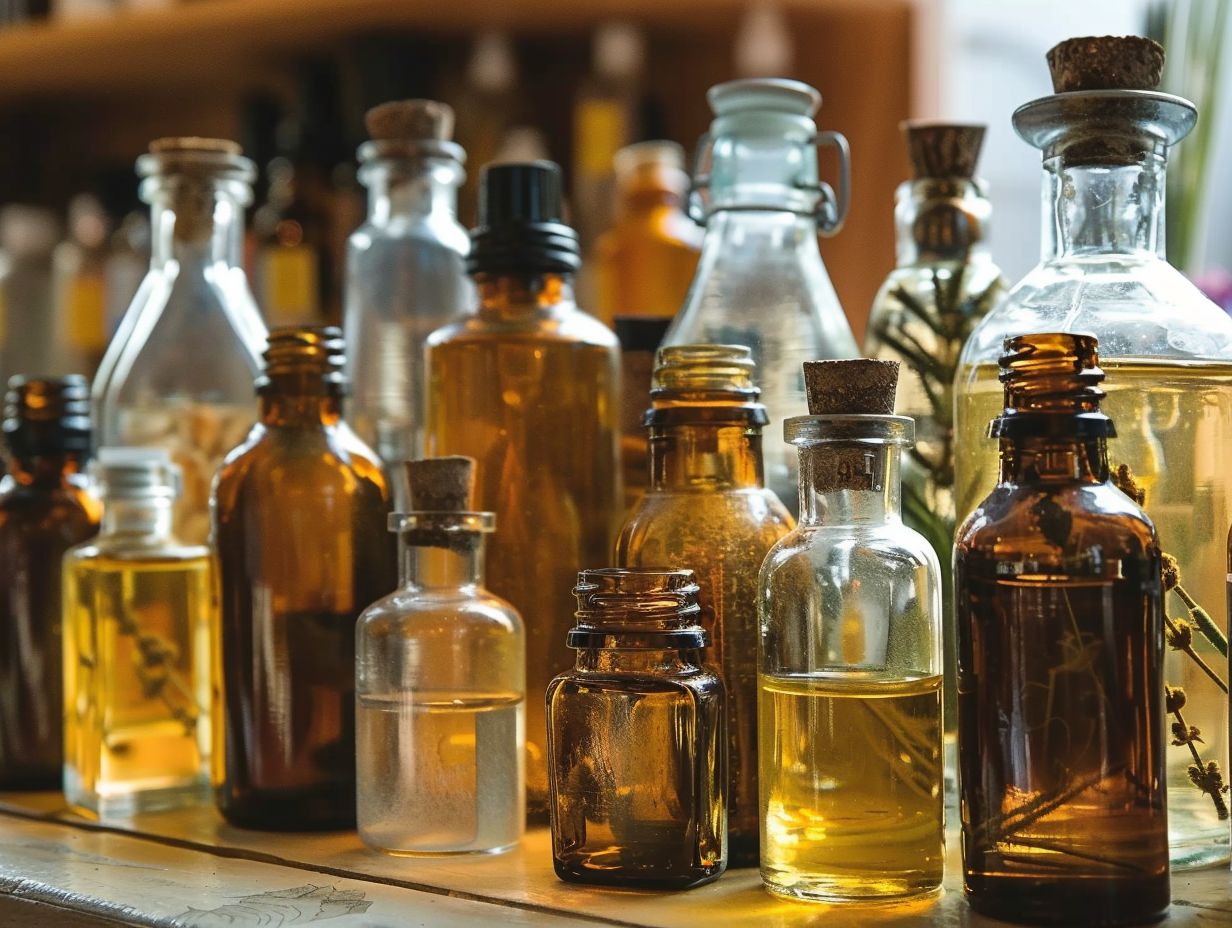
When you blend musky oils like sandalwood or patchouli with citrus options such as orange or bergamot, you create a delightful aroma that uplifts the senses and promotes a sense of well-being. These mixtures are not only pleasing to the nose but also offer multiple benefits for both mind and body.
For example, diffusing a mix of musky and citrus oils can help reduce feelings of stress and anxiety, creating a calming atmosphere in your home or office. In addition, these blends can also be utilized in natural cleaning products for their antimicrobial properties, leaving your space smelling fresh and clean.
It’s crucial to remember that certain groups, like young children, pets, or individuals with epilepsy, may be more sensitive to strong scents or specific essential oil components. It’s advisable to dilute the oils properly and use them in moderation to avoid any adverse reactions.
With Floral Essential Oils
Pairing musky essential oils with floral counterparts creates captivating and nuanced blends, ideal for personal care products, but proper dilution is essential, especially for those with heart problems.
Blending musky and floral essential oils is an art that can elevate the sensory experience. The musky notes bring depth and grounding, while the floral scents add a delicate and uplifting touch.
Using these combined essential oils, you can create custom fragrances for perfumes, candles, and even room sprays. The possibilities are endless, allowing you to tailor scents to match your mood or the ambiance you wish to create.
In terms of dilution, it’s crucial to follow recommended guidelines, particularly if you have a preexisting heart condition. Diluting essential oils properly not only ensures safety but also enhances the effectiveness of the blend.
With Earthy Essential Oils
Blending musky essential oils with earthy counterparts like black pepper oil and patchouli yields grounding and robust aromas that evoke a sense of connection with nature, accentuating the muskiness.
Black pepper oil, with its warm and spicy notes, adds a dynamic element to the blend, creating a unique depth that resonates with both the senses and the soul.
Patchouli, known for its rich, woody aroma, brings a serene earthiness that balances the musky intensity, resulting in a harmonious olfactory experience that is both calming and invigorating.
Musk, coveted for centuries for its sensual and complex fragrance, acts as the magnetic core that ties all these scents together, creating a luxurious and enchanting blend that can be diffused, used in DIY perfumes, or incorporated into skincare formulations for a truly indulgent sensory journey.
What Are The Alternatives To Musky Essential Oils?
For those seeking alternatives to musky essential oils, options include synthetic fragrances that mimic musk, natural musks from animal sources, and other essential oils with similar scent profiles.
While synthetic fragrances can offer a cruelty-free and vegan-friendly option, some individuals might prefer authentic natural musk sourced from animals like deer or muskox. These animal-derived musks can provide a deep, rich aroma that is highly coveted in perfumery. Certain essential oils such as patchouli, vetiver, and cedarwood possess earthy and robust notes that can be used as substitutes for musky scents in blends and formulations.
Synthetic Fragrances
Synthetic fragrances can provide musky scents without using essential oils, but caution is advised, especially for individuals with sensitive skin, pets, and those concerned about potential allergenic reactions.
These synthetic fragrances are chemically composed to mimic natural aromas, offering a wide range of options for those seeking musky undertones.
It’s crucial to note that such artificial scents may contain ingredients that can potentially trigger adverse reactions. For individuals with sensitive skin, fragrance-sensitive individuals, or pet owners, it’s advisable to perform patch tests before full application.
When using products with synthetic fragrances, opt for fragrance-free versions if you’re concerned about skin irritation or allergic responses.
Natural Musks
Natural musks sourced from animals offer authentic musky scents, but proper dilution and ingestion precautions are crucial, particularly for pregnant women and individuals with specific medical conditions.
When considering alternatives to animal-derived musks, natural musky alternatives are gaining popularity. These alternatives are often plant-based but provide a similar musky scent without the ethical concerns associated with animal products. It’s important to remember that even natural musks can be potent and should be diluted properly before use to prevent skin irritation and allergies.
For pregnant women and individuals with medical conditions, extra caution is advised. Essential oils, including musky scents, can have varying effects on the body and may pose risks if used incorrectly. Always consult with a healthcare professional before using natural musks during pregnancy or if you have health concerns.
Other Essential Oils With Similar Scents
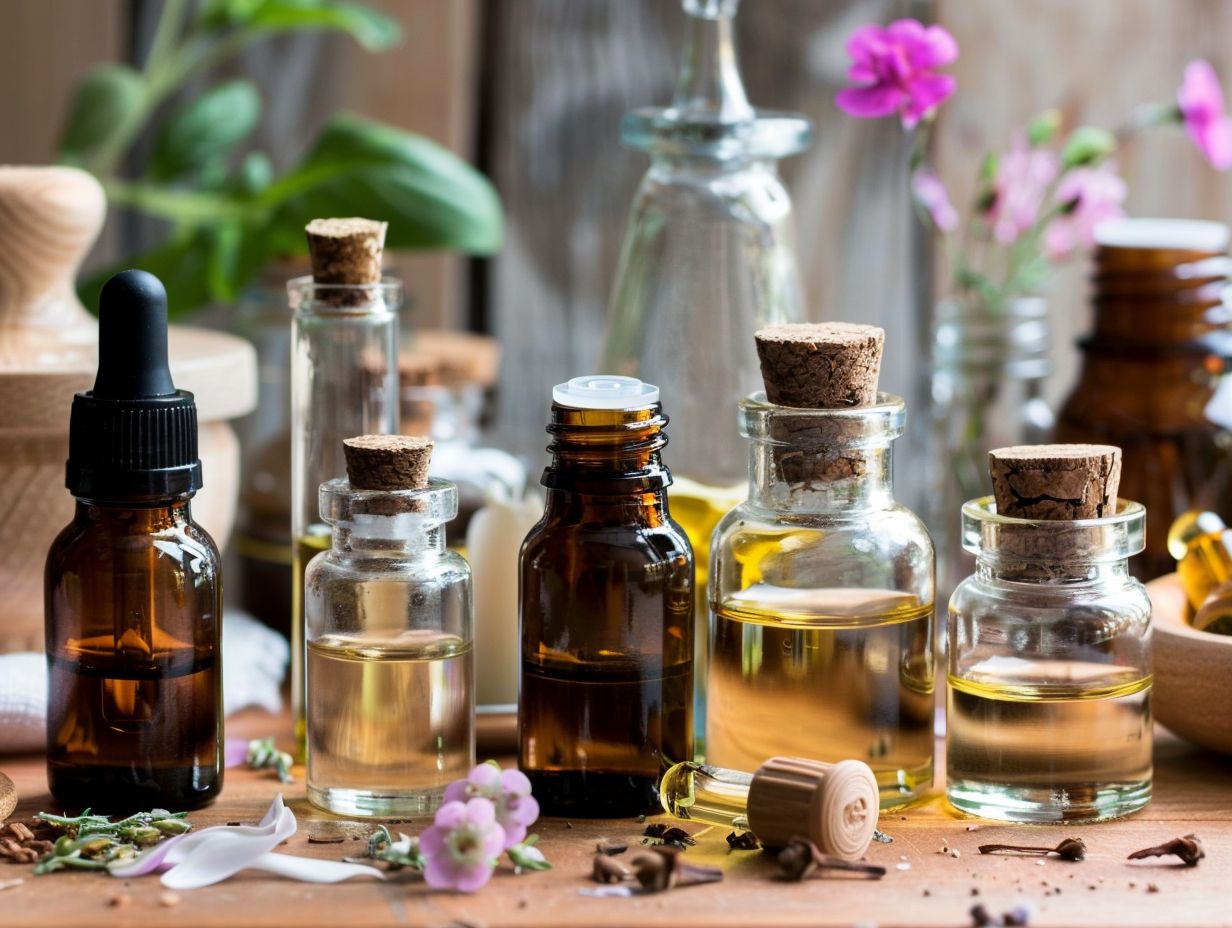
For those looking to delve into alternative options, sandalwood oil is renowned for its warm, woody notes that can add depth to your aromatherapy collection.
Similarly, cedarwood oil is another musky-scented essential oil that is believed to promote a sense of grounding and relaxation. It’s crucial to note that each individual may react differently to various oils, underscoring the importance of understanding potential allergic reactions or contraindications before use.
Always prioritize safety by conducting thorough research and seeking guidance from qualified professionals to ensure a positive and beneficial experience.
Frequently Asked Questions
What Essential Oils Are Musky?
Essential oils that are considered musky have a distinct earthy and slightly sweet aroma. These oils are often used as base notes in perfumes and aromatherapy blends.
What are some examples of musky essential oils?
Some popular musky essential oils include patchouli, vetiver, cedarwood, sandalwood, and frankincense.
Can musky essential oils be used for skin care?
Yes, musky essential oils have great benefits for the skin. They can help reduce inflammation, improve skin elasticity, and provide a natural fragrance.
Are musky essential oils safe for pets?
No, musky essential oils can be toxic to pets if ingested or used in high concentrations. It is best to keep them away from your furry friends.
Can musky essential oils be blended with other scents?
Yes, musky essential oils can be blended with other scents to create unique and personalized aromas. They blend well with floral, citrus, and spicy oils.
How can musky essential oils be used in aromatherapy?
Musky essential oils have grounding and calming properties, making them perfect for aromatherapy. They can be diffused, inhaled directly, or added to a carrier oil for massage or bath blends.

